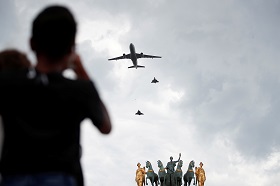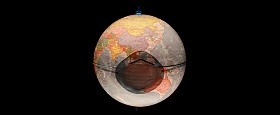French President Emmanuel Macron has his own vision about geopolitics and wants the EU to actively take part in the ongoing debate about international security and forge closer ties with Russia. Whether France can lead the EU to act autonomously remains to be seen in the future. But the new role of this country as the only nuclear power in the EU after Brexit and Macron’s personality and ambitious geopolitical agenda deserve some attention. The French President believes in the importance of dialogue and has already identified areas of potential cooperation between France, the EU and Russia that can be enriched during the novel coronavirus period.
Foreign policy and defense cooperation is considered an important aspect of European integration. Steps taken towards this direction over the last years are notable but they cannot surpass a specific threshold. The EU is not a state. Priorities do thus differ according to member-states. Some of them like the Baltic countries, for example, consider Russia a threat while others do not necessarily agree. And others, such as Greece and Cyprus, focus on the Turkish muscular approach in the Eastern Mediterranean, whereas many of their partners prefer to ignore this issue. Above all, the EU has counted almost exclusively – at least until 2017 – on the American security umbrella. In various cases after the end of the Cold War, Europe failed to act united and several of its member-states occasionally aligned their foreign and military policies with those of the US.
The beginning of the Donald Trump presidency certainly gave new impetus to the debate. Although it is not always easy to decode the intentions of the US President, his indifference for transatlantic relations offered the EU some more room for action. This does not mean that the US commitment to European security faded away. But it signals that the US expected from the EU to play a bigger role in that regard. President of France Emmanuel Macron has been the first leader of an EU member-state to give a personal tint to this new role. He believes that the EU should grasp the opportunity and practically become more autonomous in international affairs by moving beyond the American shadow.
Interesting as they are, the ideas of the President of France will not have an immediate impact on the way the EU treats Russia and its general strategic thinking. Decisions on EU foreign and security issues are taken with the consensus of all member-states, and Germany never appreciated radical changes, especially in areas where it does not have the upper hand. Other political factors need to be taken into account. These include the future course of transatlantic relations that perhaps depends on the result of the American presidential election, the alleged ability of the EU to navigate between the US and other powers, EU-NATO cooperation, and obviously Macron's difficult effort to be re-elected in 2022 and Germany's post-Merkel orientation. Irrespective of the result, Macron deserves credit for bringing geopolitics back to the European agenda and for starting a process of reexamining EU-Russian relations. In a recent interview with Die Welt Permanent Representative of Russia to the EU Ambassador Vladimir Chizhov echoed the relatively good climate and spoke of potential cooperation on PESCO, the EU Green Deal and crime prevention. Joint actions against the novel coronavirus can certainly enrich the agenda.
French President Emmanuel Macron has his own vision about geopolitics and wants the EU to actively take part in the ongoing debate about international security and forge closer ties with Russia. Whether France can lead the EU to act autonomously remains to be seen in the future. But the new role of this country as the only nuclear power in the EU after Brexit and Macron’s personality and ambitious geopolitical agenda deserve some attention. The French President believes in the importance of dialogue and has already identified areas of potential cooperation between France, the EU and Russia that can be enriched during the novel coronavirus period.
Foreign policy and defense cooperation is considered an important aspect of European integration. Steps taken towards this direction over the last years are notable but they cannot surpass a specific threshold. The EU is not a state. Priorities do thus differ according to member-states. Some of them like the Baltic countries, for example, consider Russia a threat while others do not necessarily agree. And others, such as Greece and Cyprus, focus on the Turkish muscular approach in the Eastern Mediterranean, whereas many of their partners prefer to ignore this issue. Above all, the EU has counted almost exclusively – at least until 2017 – on the American security umbrella. In various cases after the end of the Cold War, Europe failed to act united and several of its member-states occasionally aligned their foreign and military policies with those of the US.
The beginning of the Donald Trump presidency certainly gave new impetus to the debate. Although it is not always easy to decode the intentions of the US President, his indifference for transatlantic relations offered the EU some more room for action. This does not mean that the US commitment to European security faded away. But it signals that the US expected from the EU to play a bigger role in that regard. President of France Emmanuel Macron has been the first leader of an EU member-state to give a personal tint to this new role. He believes that the EU should grasp the opportunity and practically become more autonomous in international affairs by moving beyond the American shadow.
Macron seeks to make a difference at the EU level. From the moment, economic policies are principally shaped by Germany, he plays the card of geopolitics. In so doing, he advocates for closer relations with Russia. Macron and his Russian counterpart Vladimir Putin maintain a good personal relationship as it already became clear during their first meeting the Versailles Palace in May 2017. This does hardly constitute an exception for the French President’s attitude though. He is similarly forging good personal ties with other leaders, including Donald Trump, Chinese President Xi Jinping and German Chancellor Angela Merkel. In his view, dialogue can only help even if differences do exist. This is certainly the case for French-Russian relations as the two countries diverge on some themes, mainly on Ukraine and Syria. Macron emphasis on the importance of cooperation was also confirmed during the COVID-19 crisis. In an interview with Financial Times in April 2020, he reiterated the concept of strategic dialogues with Russia.
Macron’s stance vis-à-vis Moscow is being suspiciously seen by some American and European commentators because he thinks out of the box. Criticism has been on the rise since the publication of his interview with The Economist in November 2019, where he considered NATO brain-dead. He later stood at the same remarks and insisted on the need of the Alliance to better define its enemies. The French President envisages a different European security architecture from the Cold War years and elaborates on a new partnership with Russia by gradually overcoming distrust. Among other things, he sees potential areas of cooperation, for example, in space and cybersecurity, and he remains optimistic about the efficiency of the Normandy format talks. In December 2019, he invited Merkel, Putin and the new Ukrainian President of Ukraine Volodymyr Zelenskiy to Paris for talks on the stabilization of the situation in Ukraine. At the bilateral level, the resumption of the 2+2 dialogue with the participation of French and Russian Foreign and Defense Ministers outlines the mutual interest in synergies. In May 2020, Florence Parly and Sergei Shoigu discussed anti-coronavirus measures and arms control in a telephone conversation.
Macron does not bury his head in the sand when it comes to complicated themes. In his talk to Foreign Ambassadors in August 2019, he said that the end of the INF treaty required the EU to have a dialogue with Russia 'because the missiles would return to our territory.' More importantly, in his February 2020 speech on the French defense and deterrence strategy, he appeared confident that Moscow would be ‘a constructive player’ in order for the collective security and stability conditions in Europe to improve. His ambition for the EU is to develop an international arms control agenda in view of the potential return of military and nuclear competition by 2021 as the future of a New START Treaty also remains unclear. Obviously, France’s nuclear deterrence – especially after Brexit was concluded in January 2020 – adds to its gravitas at the EU level. Macron’s phrase that ‘the vital interests of France now have a European dimension’ opens the door.
Interesting as they are, the ideas of the President of France will not have an immediate impact on the way the EU treats Russia and its general strategic thinking. Decisions on EU foreign and security issues are taken with the consensus of all member-states, and Germany never appreciated radical changes, especially in areas where it does not have the upper hand. Other political factors need to be taken into account. These include the future course of transatlantic relations that perhaps depends on the result of the American presidential election, the alleged ability of the EU to navigate between the US and other powers, EU-NATO cooperation, and obviously Macron's difficult effort to be re-elected in 2022 and Germany's post-Merkel orientation. Irrespective of the result, Macron deserves credit for bringing geopolitics back to the European agenda and for starting a process of reexamining EU-Russian relations. In a recent interview with Die Welt Permanent Representative of Russia to the EU Ambassador Vladimir Chizhov echoed the relatively good climate and spoke of potential cooperation on PESCO, the EU Green Deal and crime prevention. Joint actions against the novel coronavirus can certainly enrich the agenda.






